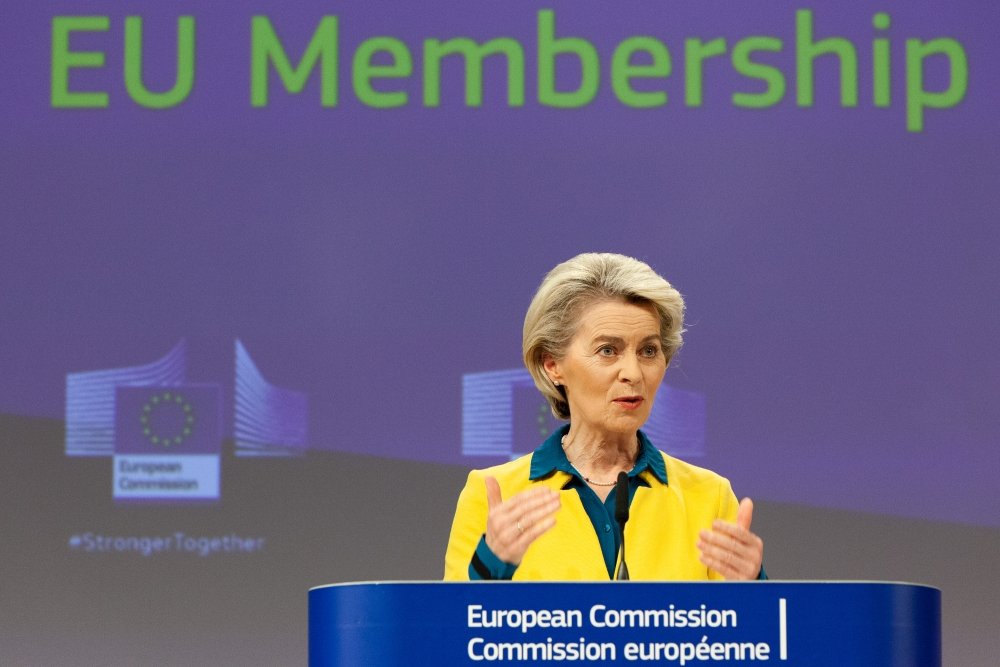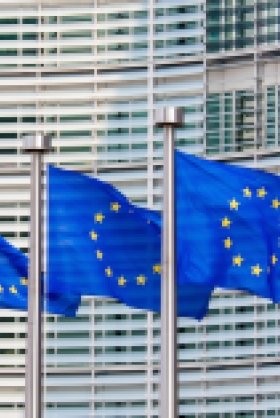Balancing Act: Charting the Course for EU Enlargement and Reform

European Commission - Audiovisual Service
The European Commission recently delivered on its promise to bring enlargement back into the limelight. On March 12, it recommended opening accession negotiations with Bosnia and Herzegovina and put forward draft negotiating frameworks for Ukraine and Moldova. The three countries checked off another significant (if yet symbolic) step on their respective paths towards EU membership, receiving approval from EU leaders at their meeting on March 21-22.
The day before, the Commission also adopted the Communication on proposed pre-enlargement reforms and policy reviews. Unlike the (justified) fanfare around Bosnia and Herzegovina’s green light for membership talks, this document received little to no attention. However, according to the Commission it marks the start of the policy review process on internal EU reforms needed for enlargement. So how does the Commission plan to prepare for a larger and stronger union?
Values remain fundamental
As laid down in Article 2 of the Treaty of the European Union, the EU is founded on the respect for democratic principles, rule of law, and fundamental rights. Welcoming new member states therefore requires ensuring these values can continue being upheld throughout the Union. With the revised enlargement methodology from 2020, the Commission already put rule of law at the center of the accession process.
Under this approach, new candidate countries must open and close their membership negotiations with the fundamentals cluster. This enables continued monitoring of progress and the ability to address backsliding in democratic norms and values throughout the negotiations. In last year’s State of the Union Speech, Commission President Ursula von der Leyen announced the integration of candidate countries who are further along in their accession process into the annual Rule of Law Reports. This would provide an added tool for steering dialogue on the necessary reforms, if assessments are effectively integrated into the country progress reports, as well as a smoother administrative transition once they become full-fledged members.
The EU, however, continues to have its fair share of difficulties fostering democratic resilience even among its current members. Since joining the EU, the bloc has seen democratic backsliding in Hungary and Poland. Most recently the Slovakian government also proposed worrisome legislation that would curtail freedom of expression, media freedom and protection of civic space. The key to protecting the rule of law after enlargement therefore does not only lie in “deep-rooted” transformations in candidate countries, but also in reforming the EU's internal approach for protecting its fundamental values and democratic principles.
The EU has been struggling in this area with 27 members. Without concrete steps, it could struggle even more with over 30 members in the future. Resilience is crucial to safeguard democratic norms. The upcoming policy reviews should therefore not only focus on reinforcing a corrective and punitive rule-of-law mechanism. But also on how to strengthen the proactive measures, such as the Rule of Law Toolbox and support for democratic civic actors in member states, to effectively protect from democratic backsliding.
Managing EU Policies
Bringing new countries into the mix will inevitably affect the benefits and functioning of several EU policies. While some policy reforms will be straightforward, others will be tougher to crack. The EU's Common Agricultural Policy (CAP) is a good example of the challenging reforms the future enlargement will bring. In the case of the CAP, the key will be successfully integrating Ukraine, which is among the top agricultural producers in the world, while ensuring a level-playing field between current and new members.
Under the current CAP subsidy scheme, Ukraine would receive €85 billion in agriculture subsidies after joining the EU. This would result in a 20% cut of funds for current member states. Ukrainian agricultural imports are already testing the EU’s unity and solidarity with the country. With vested interests of several member states, such as France and Poland, and big agribusiness stakeholders as well as recent pressures from farmers protesting across Europe, one can already picture more convoys of tractors rolling down the streets of European capitals.
The CAP–although the most prominent–represents only one of the several difficult policies that will need to be substantially changed ahead of future enlargement. Another uphill battle will be reforming the cohesion policy and the EU budget. While the Commission is a well-oiled machine when it comes to drafting new policy proposals, the negotiations that follow among EU institutions can often be long, arduous, and highly politicized. These announced policy reviews by the Commission are only the beginning and will show the extent of reforms the EU will need to undertake.
Gradual Access to the Single Market?
The proposed policy reviews will also factor into gradual access to the Single Market for candidate countries. Western Balkan candidate countries have long been arguing for such an approach. The tangible economic benefits from access to certain areas of the Single Market would mitigate the public dissatisfaction with the speed and credibility of the enlargement process. This approach regained attention with the revived enlargement momentum after Russia’s invasion of Ukraine. Since then, EU leaders have agreed on the need to “further advance gradual integration” in the European Council conclusions from June 2022.
The Commission’s proposal is, however, the first formal attempt to assess the feasibility of rolling out gradual access to the Single Market. While a positive development, more work needs to be done to define how candidate countries will be granted such “preliminary” access. Currently, progress in negotiations depends on member states’ unanimous support. If the same applies for gradual integration, managing expectations in candidate countries will be crucial to avoid further loss of trust in the EU integration process.
In addition, if candidate countries already take on certain obligations and benefits of EU membership before joining, this should have an impact on their formal accession process. To continue the enlargement momentum, the next Commission therefore needs to outline how gradual access to the Single Market can translate to progress in specific accession benchmarks. This can motivate further reforms in candidate countries, strengthen the merit-based approach, as well as make it more difficult for member states to block progress due to bilateral issues.
Governing with 30+ Members
Preparing for a larger union will also require institutional adjustments. Discussions around EU institutional reform are not new, yet even two years after the end of the Conference on the Future of Europe there seems to be little agreement on the way forward. As the EU faces geopolitical challenges, the need for more efficient decision-making persists.
The Commission’s proposal, however, lacks ingenuity when it comes to institutional reform. It only puts forth refurbished ideas of changing the decision-making process from unanimity to qualified majority voting (QMV) using the passerelle clauses or constructive abstention, brushing aside the European Parliament’s (EP) call for a convention for the revision of the treaties. Despite current security imperatives, many, mostly smaller, member states remain against QMV, due to fears of losing influence in the EU's internal power dynamics. These concerns will need to be reconciled if the EU really wants to move from words to deeds on becoming a more agile actor in this increasingly uncertain geopolitical landscape.
Unanimous decision-making does not only affect the governing of an enlarged Union, but the process of getting to it. The candidate country’s progress depends on unanimous support in the Council at every stage of the accession process. Yet most Western Balkans accession paths have up to this point been vetoed at least once by a member state due to bilateral issues, affecting the credibility of the process in the region. In the proposal, the Commission rightly calls for the Council to change to voting with a qualified majority in “certain interim steps of the enlargement process.” Such a change is needed. It could drastically speed up the negotiations process as well as build up its credibility.
The Commission’s proposal is a welcomed reassurance of the EU’s commitment to be ready for new members. It shows enlargement remains the EU’s strongest geopolitical tool, while also its biggest challenge. In the coming months, the European Council is expected to adopt a new strategic agenda and an internal reform roadmap. While Europe is in campaign mode for the European Parliament elections in June, adoption of these documents will play a vital role in ensuring the reform and enlargement efforts stay the course in the next EU institutional cycle.
The EU of tomorrow will be defined by change. The to-do list of reforms is long and ambitious, and will require strong political will from all actors involved. The results of the upcoming EP elections as well as several national elections will therefore serve as a crucial indicator of whether and how the EU will move towards a Union fit for enlargement and fit for tomorrow.
About the Author


Global Europe Program
The Global Europe Program is focused on Europe’s capabilities, and how it engages on critical global issues. We investigate European approaches to critical global issues. We examine Europe’s relations with Russia and Eurasia, China and the Indo-Pacific, the Middle East and Africa. Our initiatives include “Ukraine in Europe” – an examination of what it will take to make Ukraine’s European future a reality. But we also examine the role of NATO, the European Union and the OSCE, Europe’s energy security, transatlantic trade disputes, and challenges to democracy. The Global Europe Program’s staff, scholars-in-residence, and Global Fellows participate in seminars, policy study groups, and international conferences to provide analytical recommendations to policy makers and the media. Read more










